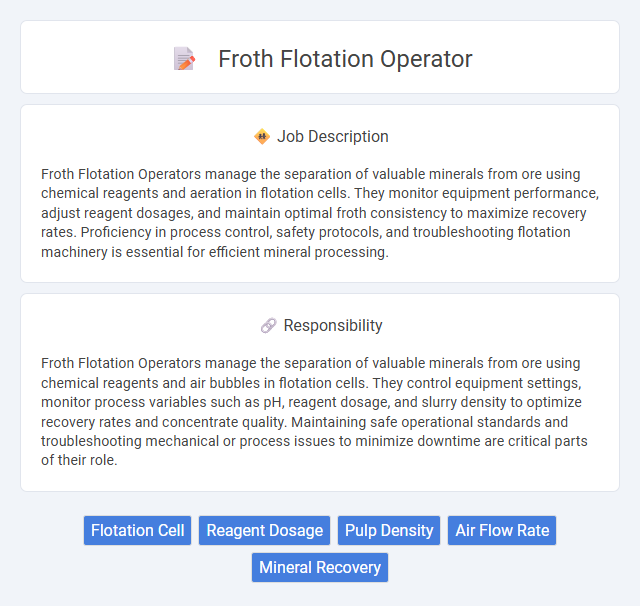
Froth Flotation Operators manage the separation of valuable minerals from ore using chemical reagents and aeration in flotation cells. They monitor equipment performance, adjust reagent dosages, and maintain optimal froth consistency to maximize recovery rates. Proficiency in process control, safety protocols, and troubleshooting flotation machinery is essential for efficient mineral processing.
Individuals with strong attention to detail and the ability to work in fast-paced industrial environments are likely suitable for a Froth Flotation Operator role. Candidates who can handle repetitive tasks, maintain focus for extended periods, and work effectively in team settings have a higher probability of success. Those with physical endurance and good hand-eye coordination may also find this job fitting their skills and condition.
Qualification
A Froth Flotation Operator must have a high school diploma or equivalent, with specialized training in mineral processing or mining operations preferred. Proficiency in operating flotation cells, monitoring control panels, and adjusting chemical reagents is essential for optimal recovery rates. Strong problem-solving skills and knowledge of safety protocols in flotation plant environments enhance operational efficiency and workplace safety.
Responsibility
Froth Flotation Operators manage the separation of valuable minerals from ore using chemical reagents and air bubbles in flotation cells. They control equipment settings, monitor process variables such as pH, reagent dosage, and slurry density to optimize recovery rates and concentrate quality. Maintaining safe operational standards and troubleshooting mechanical or process issues to minimize downtime are critical parts of their role.
Benefit
A Froth Flotation Operator may experience increased job stability due to the ongoing demand for skilled workers in mineral processing industries. The role might offer opportunities for competitive wages and benefits packages in regions rich in mining activities. There is potential for career advancement as proficiency in operating and maintaining flotation equipment becomes more valuable over time.
Challenge
Froth Flotation Operator roles likely involve managing complex mineral separation processes that require precise control and adjustment of chemical reagents and airflow. Operators probably face challenges such as maintaining consistent froth quality under varying feed conditions and troubleshooting equipment malfunctions to prevent production delays. The role demands strong problem-solving skills and adaptability to handle operational fluctuations and optimize recovery rates.
Career Advancement
Froth Flotation Operators play a critical role in mineral processing, operating equipment that separates valuable minerals from ore based on differences in surface properties. Mastery of flotation principles and equipment optimization can lead to career advancement opportunities such as Senior Operator, Process Technician, or Plant Supervisor roles. Pursuing certifications in mineral processing and gaining experience with advanced flotation technologies significantly enhance prospects for promotion within the mining industry.
Key Terms
Flotation Cell
A Froth Flotation Operator specializes in managing and optimizing flotation cells to separate valuable minerals from ore using air bubbles and chemical reagents. Precise control over variables such as reagent dosage, air flow, and pulp density in flotation cells ensures maximum recovery rates and product purity. Expertise in monitoring cell performance and troubleshooting mechanical or chemical issues is critical for maintaining operational efficiency in mineral processing plants.
Reagent Dosage
Froth flotation operators precisely control reagent dosage to optimize mineral separation efficiency, adjusting chemical inputs based on real-time feedback from slurry characteristics. Effective reagent management enhances the selectivity of valuable minerals, reducing processing costs and maximizing recovery rates. Operators monitor dosing systems and maintain accurate records to ensure consistent reagent application aligned with plant performance targets.
Pulp Density
A Froth Flotation Operator monitors and adjusts pulp density to optimize the separation of valuable minerals from ore during the flotation process. Maintaining precise pulp density, typically between 25% and 40% solids by weight, is critical for maximizing recovery rates and minimizing reagent consumption. Continuous measurement and control of pulp density ensure consistent froth stability and enhance overall plant efficiency.
Air Flow Rate
The Froth Flotation Operator monitors and adjusts the air flow rate to ensure optimal bubble formation, which is crucial for separating valuable minerals from ore. Precise control of the air flow rate enhances flotation performance and increases recovery efficiency in mineral processing plants. Consistent air flow measurement and regulation mitigate process disturbances and improve overall plant productivity.
Mineral Recovery
Froth Flotation Operators are responsible for monitoring and controlling flotation equipment to maximize mineral recovery in mining operations. Their expertise in adjusting reagent dosages, air flow, and slurry pH directly impacts the efficiency and yield of valuable mineral concentrates. Precise operation and troubleshooting of flotation cells are essential to optimize separation processes and ensure high-quality ore processing results.
 kuljobs.com
kuljobs.com